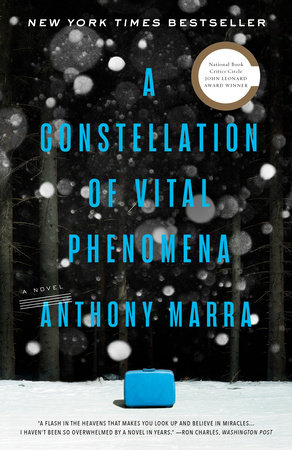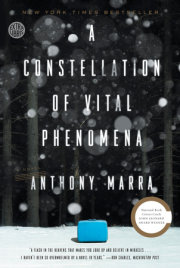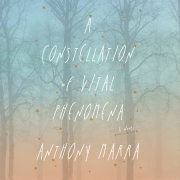Chapter 12004
On the morning after the Feds burned down her house and took her father, Havaa woke from dreams of sea anemones. While the girl dressed, Akhmed, who hadn't slept at all, paced outside the bedroom door, watching the sky brighten on the other side of the window glass; the rising sun had never before made him feel late. When she emerged from the bedroom, looking older than her eight years, he took her suitcase and she followed him out the front door. He had led the girl to the middle of the street before he raised his eyes to what had been her house. "Havaa, we should go," he said, but neither moved.
The snow softened around their boots as they stared across the street to the wide patch of flattened ash. A few orange embers hissed in pools of gray snow, but all else was char. Not seven years earlier, Akhmed had helped Dokka build an addition so the girl would have a room of her own. He had drawn the blueprints and chopped the hardwood and cut it into boards and turned them into a room; and when Dokka had promised to help him build an addition to his own house, should he ever have a child, Akhmed had thanked his friend and walked home, the knot in his throat unraveling into a sob when the door closed behind him. Carrying that lumber the forty meters from the forest had left his knuckles blistered, his underarms sopping, but now a few hours of flames had lifted what had taken him months to design, weeks to carry, days to build, all but the nails and rivets, all but the hinges and bolts, all into the sky. And too were carried the small treasures that had made Dokka's house his own. There was the hand-carved chess set on a round sidetable; when moved, the squat white king wobbled from side to side, like a man just sober enough to stand, and Dokka had named his majesty Boris Yeltsin. There was the porcelain vase adorned with Persian arabesques, and beside that a cassette deck-radio with an antenna long enough to scrape the ceiling when propped up on a telephone book, yet too short to reach anything but static. There was the eighty-five-year-old Qur'an, the purple cover writhing with calligraphy, that Dokka's grandfather had purchased in Mecca. There were these things and the flames ate these things, and since fire doesn't distinguish between the word of God and the word of the Soviet Communications Registry Bureau, both Qur'an and telephone directory returned to His mouth in the same inhalation of smoke.
The girl's fingers braceleted his wrist. He wanted to throw her over his shoulder and sprint northward until the forest swallowed the village, but standing before the blackened timbers, he couldn't summon the strength to bring a consoling word to his lips, to hold the girl's hand in his own, to move his feet in the direction he wanted them to go.
"That's my house." Her voice broke their silence and he heard it as he would the only sound in an empty corridor.
"Don't think of it like that," he said.
"Like what?"
"Like it's still yours."
He wound her bright orange scarf around her neck and frowned at the sooty fingerprint on her cheek. He had been awake in bed the previous night when the Feds came. First the murmur of a diesel engine, a low rumble he'd come to fear more than gunfire, then Russian voices. He had gone to the living room and pulled back the blackout curtain as far as he dared. Through the triangle of glass, headlights parted the night. Four soldiers, stocky, well fed, emerged from the truck. One drank from a vodka bottle and cursed the snow each time he stumbled. This soldier's grandfather had told him, the morning the soldier reported to the Vladivostok conscription center, that he would have perished in Stalingrad if not for the numbing grace of vodka; the soldier, whose cheeks were divoted from years of applying toothpaste to his adolescent acne, believed Chechnya to be a worse war than Stalingrad, and rationed his vodka accordingly. From his living room Akhmed wanted to shout, beat a drum, set off a flare. But across the street, they had already reached Dokka's door and he didn't even look to the phone that was without a pulse for ten years now. They knocked on the door once, twice, then kicked it down. Through the doorway, Akhmed watched torchlight move across the walls. So passed the longest two minutes of Akhmed's life until the soldiers reappeared in the doorway with Dokka. The duct tape strip across his mouth wrinkled with his muted screams. They pulled a black hood over his head. Where was Havaa? Sweat formed on Akhmed's forehead. His hands felt impossibly heavy. When the soldiers grabbed Dokka by the shoulders and belt, tumbling him into the back of the truck and slamming the door, the relief falling over Akhmed was quickly peeled back by self-loathing, because he was alive, safe in his living room, while in the truck across the street, not twenty meters away, Dokka was a dead man. The designation 02 was stenciled above the truck bumper in white paint, meaning it belonged to the Interior Ministry, meaning there would be no record of the arrest, meaning Dokka had never officially been taken, meaning he would never come back. "Where's the girl?" the soldiers asked one another. "She's not here." "What if she's hiding beneath the floorboards?" "She's not." "Take care of it just in case." The drunken soldier uncapped a petrol jug and stumbled into Dokka's house; when he returned to the threshold, he tossed a match behind him and closed the door. Flames clawed their way up the front curtains. The glass panes puddled on the sill. Where was Havaa? When the truck finally left, the fire had spread to the walls and roof. Akhmed waited until the taillights had shrunk to the size of cherries before crossing the street. Running a wide circle around the flames, he entered the forest behind the house. His boots broke the frigid undergrowth and he could have counted the rings of tree stumps by the firelight. Behind the house, hiding among the trees, the girl's face flickered. Streaks of pale skin began under her eyes, striping the ash on her cheeks. "Havaa," he called out. She sat on a suitcase and didn't respond to her name. He held her like a bundle of loose sticks in his arms, carried her to his house and with a damp towel wiped the ash from her forehead. He tucked her in bed beside his invalid wife and didn't know what to do next. He could have gone back outside and thrown snowballs at the burning house, or lain in bed so the girl would feel the warmth of two grown bodies, or performed his ablutions and prostrated himself, but he had completed the isha'a hours earlier and if five daily prayers hadn't spared Dokka's house, a sixth wouldn't put out the flames. Instead he went to the living room window, drew open the blackout curtains, and watched the house he had helped build disappear into light. And now, in the morning, as he tightened the orange scarf around her neck, he found a fingerprint on the girl's cheek, and, because it could have been Dokka's, he left it.
"Where are we going?" she asked. She stood in the frozen furrow of the previous night's tire tracks. The snow stretched on either side. Akhmed hadn't prepared for this. He couldn't imagine why the Feds would want Dokka, much less the girl. She stood no taller than his stomach and weighed no more than a basket of firewood, but to Akhmed she seemed an immense and overwhelming creature whom he was destined to fail.
"We're going to the city hospital," he said, with what he hoped was an assertive tone.
"Why?"
"Because the hospital is safe. It's where people go when they need help. And I know someone there, another doctor," he said, though all he knew of her was her name. "She'll help."
"How?"
"I'm going to ask if you can stay with her." What was he saying? Like most of his plans, this one seemed so robust in his mind but fell like a flightless bird when released to the air. The girl frowned.
"He's not coming back, is he?" she asked. She focused on the blue leather suitcase that sat on the street between them. Eight months earlier, her father had asked her to prepare the suitcase and leave it in the closet, where it had remained until the previous night, when he thrust it into her hands and pushed her out the back door as the Feds broke through the front.
"I don't think so."
"But you don't know?" It wasn't an accusation, but he took it as one. Was he so incompetent a physician that she hesitated to trust him with her father's life even in speculation? "We should be safe," he said. "It's safer to think he won't come back."
"But what if he does?"
The longing knotted into such a simple question was more than he could contemplate. What if she cried? It suddenly seemed like a terrifying possibility. How would he stop her? He had to keep her calm, keep himself calm; panic, he knew, could spread between two people more quickly than any virus. He fiddled with her scarf. Somehow it had survived the fire as orange as the day it was pulled from the dye. "How about this: if he comes back, I'll tell him where you are. Is that a good idea?"
"My father is a good idea."
"Yes, he is," Akhmed said, relieved they had this to agree on.
They plodded along the Eldar Forest Service Road, the village's main thoroughfare, and their footprints began where the tire tracks ended. On either side he saw houses by surname rather than address. A face appeared and vanished in an unboarded window.
Copyright © 2013 by Anthony Marra. All rights reserved. No part of this excerpt may be reproduced or reprinted without permission in writing from the publisher.









